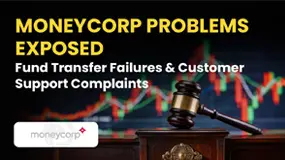European stocks retreat as oil soars on Middle East conflict
Abstract:On Monday, European stock markets experienced a decline as investors evaluated the ramifications of the military conflict in the Middle East and the consequent rise in oil prices.

On Monday, European stock markets experienced a decline as investors evaluated the ramifications of the military conflict in the Middle East and the consequent rise in oil prices.
As of 03:25 ET (07:25 GMT), Germany's DAX index recorded a 1% decrease, France's CAC 40 saw a drop of 1.1%, while the U.K.'s FTSE 100 fell by 0.3%. However, the FTSE 100 received some support from its significant oil companies, aiding it to some extent.
Oil soars on Middle East conflict escalation
The Israeli-Palestinian conflict escalated to full-blown war over the weekend, as members of the Islamist group Hamas attacked several Israeli towns, killing hundreds of Israelis and abducted dozens more. In response, Israeli air strikes pounded numerous targets in Gaza, resulting in numerous casualties.
This new source of conflict, with the Ukrainian war still ongoing, has seen oil prices surge, to the detriment of most European stock markets. The higher oil prices could add to inflationary pressures, prompting more central bank tightening, and also acts as a tax on consumers.
The benchmark Brent and Nymex contracts gained as much as 5%, before slipping slightly back, just when prices had been on the retreat.
Last week saw oil prices post their steepest weekly losses since March, as Brent posted a decline of about 11% and WTI recorded an over 8% drop, on worries that persistently high interest rates will slow global growth and hammer fuel demand.
At 03:25 ET, the U.S. crude futures traded 3.3% higher at $85.51 a barrel, while the Brent contract climbed 2.9% to $87.00 a barrel.
German industrial production weakened in August
According to the latest data published on Monday, there was a decrease of 0.2% in German industrial production in August compared to the previous month. This figure indicates a better performance compared to the revised 0.6% decline recorded in the previous month.
However, it is important to note that Germany, being the dominant economy in the eurozone, has significant dependence on energy expenses. Consequently, if oil prices continue to rise consistently, it would adversely affect the country's economy.
Additionally, this is the fourth consecutive month this sector has retreated, stoking recession fears.
ECB Vice President Luis de Guindos and Bank of Spain Governor Pablo Hernández de Cos along with ECB board member Andrea Enria are set to speak during the session.
Vodafone (NASDAQ:VOD)'s Spanish unit in play - Expansion
In corporate news, Vodafone (LON:VOD) stock rose 0.2% after the Spanish Expansion newspaper reported that U.S.-based buyout fund Apollo Global Management (NYSE:APO) is readying a bid with local fund JB Capital for the Spanish unit of the U.K. telecom giant.
The news about a potential bid comes three weeks after British telecom investment company Zegona said it was in talks with Vodafone to buy the Spanish unit.
Elsewhere, the third quarter earnings season gets underway this week, with particular focus on reports from several Wall Street banking giants, including JPMorgan Chase (NYSE:JPM), Citigroup (NYSE:C) and Wells Fargo (NYSE:WFC) on Friday.
The outcome of the earnings season may greatly influence the short-term trajectory of stocks, keeping in mind that the S&P 500 maintains a 10% gain for the year, despite its recent decline.
Furthermore, there has been a 1% increase in gold futures, reaching a value of $1,863.65 per ounce. On the other hand, the EUR/USD pair experienced a 0.5% decrease in trading, settling at 1.0537.

Read more

Moneycorp Problems Exposed: Fund Transfer Failures & Customer Support Complaints
Failing to transfer funds into or out of your Moneycorp trading account? Have you faced a sudden account closure by a United Kingdom-based forex broker? Has the broker’s customer support service failed to resolve your queries? Did their behavior remain far from good while addressing your queries? You are not alone! Many traders have questioned such alleged trading practices by the broker. In this Moneycorp review article, we have highlighted some of their complaints. Read on!

Arena Capitals User Reputation: Looking at Real User Reviews and Common Problems
When people who invest ask, "Is Arena Capitals safe or a scam?" the proof shows we need to be very careful. This broker works without proper rules from top financial authorities, gets very low safety scores from independent financial watchdogs, and many users have serious complaints about them. The information available to everyone suggests that giving your capital to this company could lead to losing it all. This analysis doesn't guess - it looks at these important warning signs. We will look at real facts, study actual user reviews that show big problems with taking out funds, and give a clear answer based on evidence about whether Arena Capitals can be trusted. This article gives you the facts you need to make a smart choice and keep your funds safe from an unregulated, high-risk business.

Arena Capitals Regulatory Status: A Complete Look at Its Licenses and Company Registration
When traders are choosing a brokerage, the most important questions are always about safety and whether the company is legitimate. When it comes to Arena Capitals, the verdict is clear and immediate based on extensive public data and regulatory checks. This company operates without oversight from any top-tier financial authority, putting it firmly in the high-risk category. Our analysis shows a consistent pattern of warning signs that potential investors must consider. The key findings are clear: verification platforms mark Arena Capitals with a "No Regulation" status, its company registration is in an offshore location known for its lack of financial oversight, and a growing number of user reports detail significant problems, especially with withdrawing funds. This article provides a complete, evidence-based breakdown of these facts to help you make an informed decision and protect your capital. The conclusion is that Arena Capitals presents a high potential risk to investors.

Arena Capitals Legitimacy Check: Is This a Fake Broker or a Legitimate Trading Partner?
You are here because you are asking an important question: Is Arena Capitals legit? We will answer that directly. Based on a thorough review of international regulatory databases, official warnings and direct user reports, Arena Capitals shows all the signs of a high-risk, unregulated company. It is not a safe or legitimate trading partner. The evidence strongly suggests that the operation could be an Arena Capitals scam designed to steal funds from investors. Throughout this analysis, we will break down the warning signs one by one, giving you the information needed to understand the serious risks involved. Our conclusion is clear and based on facts that can be verified.
WikiFX Broker
Latest News
Arena Capitals User Reputation: Looking at Real User Reviews and Common Problems
What Will US-Iran War Affect Stock Market: A Comprehensive Investor's Guide to 2026
Is FINOWIZ Safe or Scam? 2026 Deep Dive into Its Reputation and User Complaints
FX Deep Dive: Dollar King Returns as Energy Shock Splits G10 Currencies
The 25-Day Tipping Point: Energy Markets Stare Down a Hormuz Blockade
Eightcap Review: Understanding Fees, Features, and Important User Warnings
Exnova Review 2026: Is this Forex Broker Legit or a Scam?
Stop Letting Your Trading Rewards Gather Dust: A Limited-Time 30% Opportunity
Middle East Escalation Rocks Markets: Oil Surges while Brokers Tighten Leverage
Moneycorp Problems Exposed: Fund Transfer Failures & Customer Support Complaints
Rate Calc


